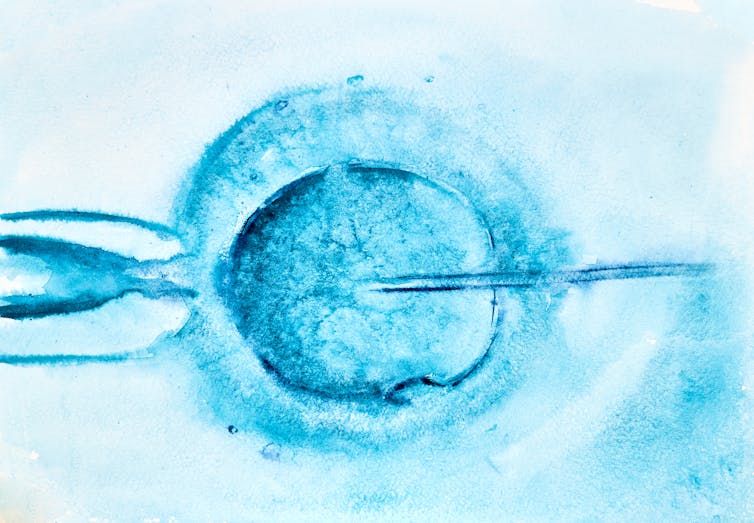IVF changes babies' genes but these differences disappear by adulthood
- Written by Jane Halliday, Professor Public Health Genetics, Murdoch Children's Research Institute
Around one in 25 Australian children are now conceived through use of assisted reproductive treatments such as IVF.
These reproductive technologies appear to leave a biological “signature” on several genes that can be measured at birth.
This may explain why assisted conception increases the chance of early delivery, low birth weight and congenital abnormalities – and the question has remained about why this might be so.
But the good news, according to our research published today in the journal Nature Communications, is these “epigenetic” changes largely disappear by adulthood.
In fact, people born via IVF are as healthy as their naturally conceived peers.
Read more: Considering using IVF to have a baby? Here's what you need to know
First, a quick lesson on epigenetics
Epigenetics is the process by which an organism interacts with the environment, switching genes on and off. This process controls which proteins the genes make and the type of cells they become, whether muscle, brain, skin, or something else.
The time around conception is associated with widespread epigenetic remodelling of the embryo, switching genes on and off, and producing the different types of cells needed to establish life.
Environmental influences such as diet around the time of conception and in pregnancy can influence the health of the offspring for many years. The biological processes associated with this remain largely unclear, but epigenetic changes are suspected.
It’s possible that conception by assisted reproductive technology disrupts the epigenetic process, resulting in a greater liklihood of congenital abnormalities caused by epigenetic changes.
Our studies
As part of a world first study, our team measured the epigenetic profile of 158 people conceived with assisted reproductive therapies and 75 people conceived without.
We studied two types of assisted reproductive therapies: in vitro fertilisation (IVF), where fertilisation occurs in a lab, and gamete intrafallopian transfer (GIFT), where fertilisation occurs in the woman’s fallopian tube.
Both techniques require ovarian stimulation – medication to stimulate the ovaries to release multiple eggs.
 One in 25 Australian children are conceived using assisted reproductive technologies such as IVF.
Trenkov/Shutterstock
One in 25 Australian children are conceived using assisted reproductive technologies such as IVF.
Trenkov/Shutterstock
With our participants’ permission, we compared their newborn heel prick blood spot, which had been routinely collected at birth, with their blood sample collected as adults, when they were aged 22 to 35 years.
What we found
We recently published an analysis of clinical assessments on these same adults, which showed no adverse health outcomes related to their growth, their risk of heart disease, diabetes, stroke or respiratory problems, and their psychological and social status.
In other words, their results were similar to the group conceived without assisted reproductive technologies.
Read more: Epigenetics: what impact does it have on our psychology?
In this latest research, we found clear epigenetic changes in the blood samples of babies born via assisted reproductive treatments, including in several previously studied genes.
Reassuringly, however, the majority of this epigenetic variation was not detectable by adulthood. This suggests these differences resolve over time.
We also found some of these changes in newborn samples collected in a completely independent group of babies conceived via assisted reproductive technologies in America. This was done to provide confidence that the changes were real.
Interestingly, the changes occurred in those conceived via both IVF (in a lab) and GIFT (in the fallopian tube).
So it appeared that ovarian stimulation – or infertility itself – seemed to be the main driver of change in epigenetic profile, rather than the process of growing the embryo in the lab.
What does it mean?
This is the first study internationally to examine the epigenetic profile of people born via assisted reproductive therapies from birth through to adulthood.
The results suggest being conceived via assisted reproduction is not likely to influence gene activity over a person’s lifetime – any such changes associated with assisted reproduction appear to disappear over time.
But further studies are needed to work out when the changes begin to disappear and when they are no longer present.
It will also be important to understand how specific assisted reproductive technology processes, such as ovarian stimulation, impact the developing epigenetic profile.
Read more: Fertility miracle or fake news? Understanding which IVF 'add-ons' really work
Authors: Jane Halliday, Professor Public Health Genetics, Murdoch Children's Research Institute





